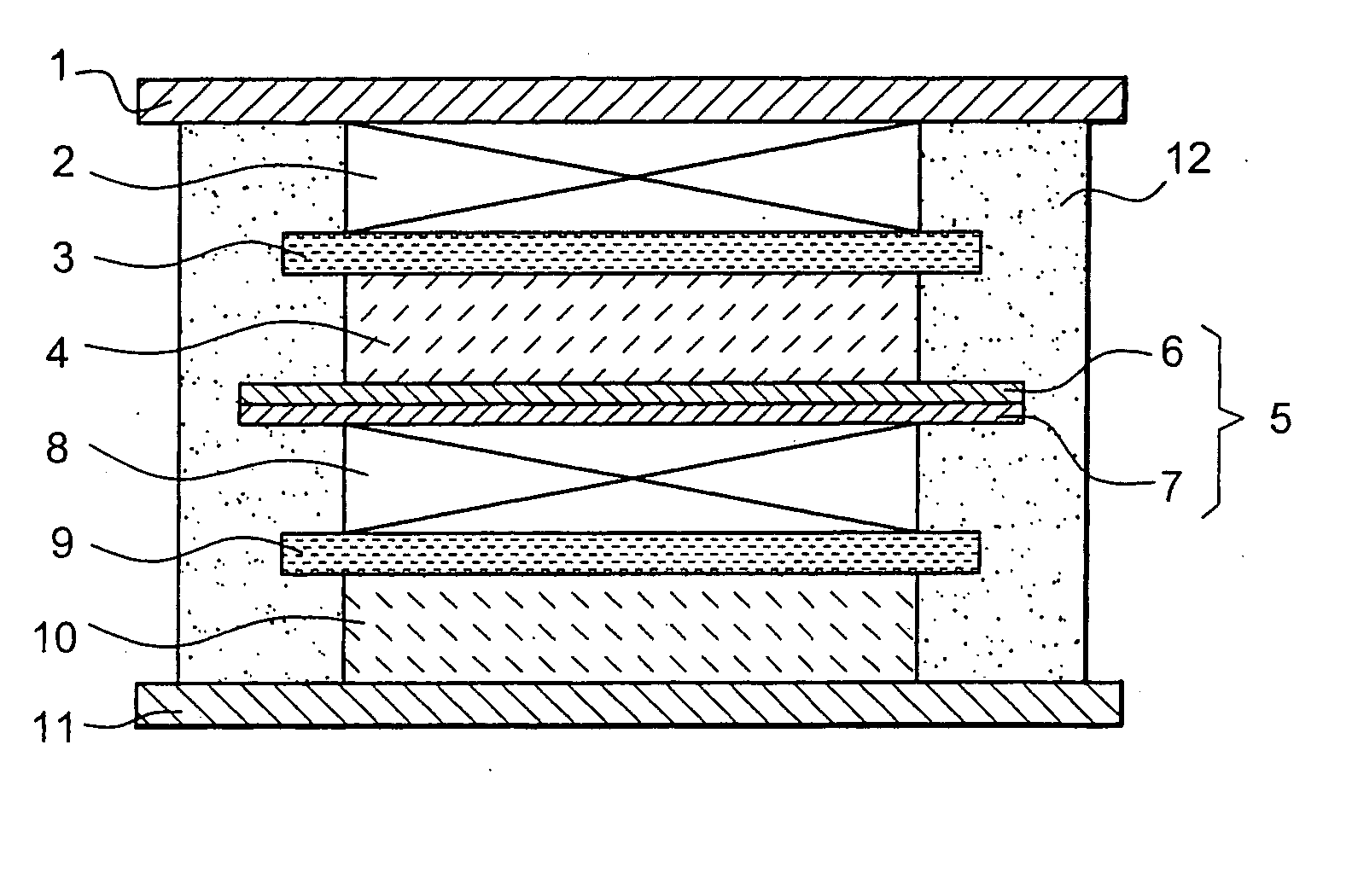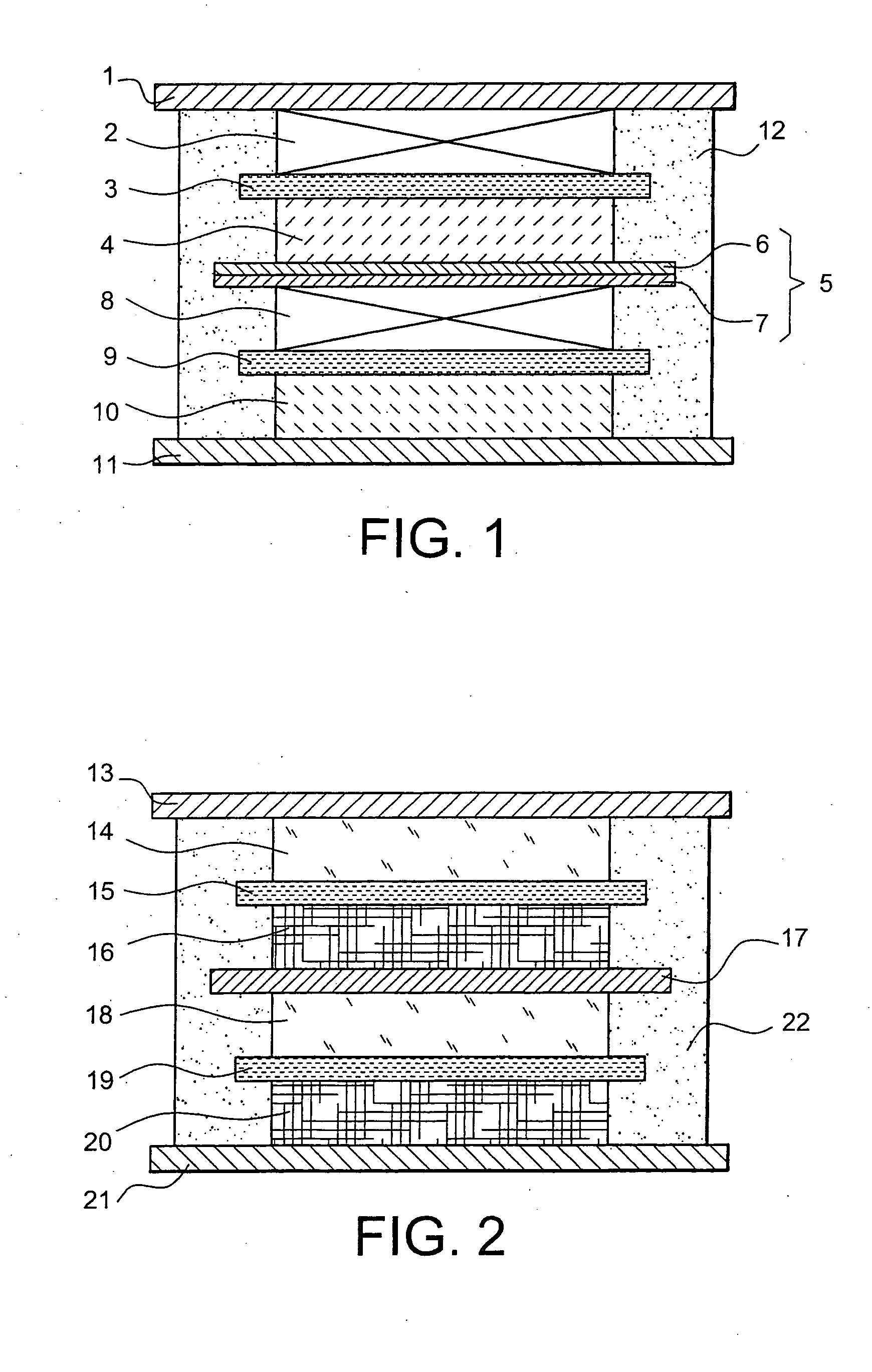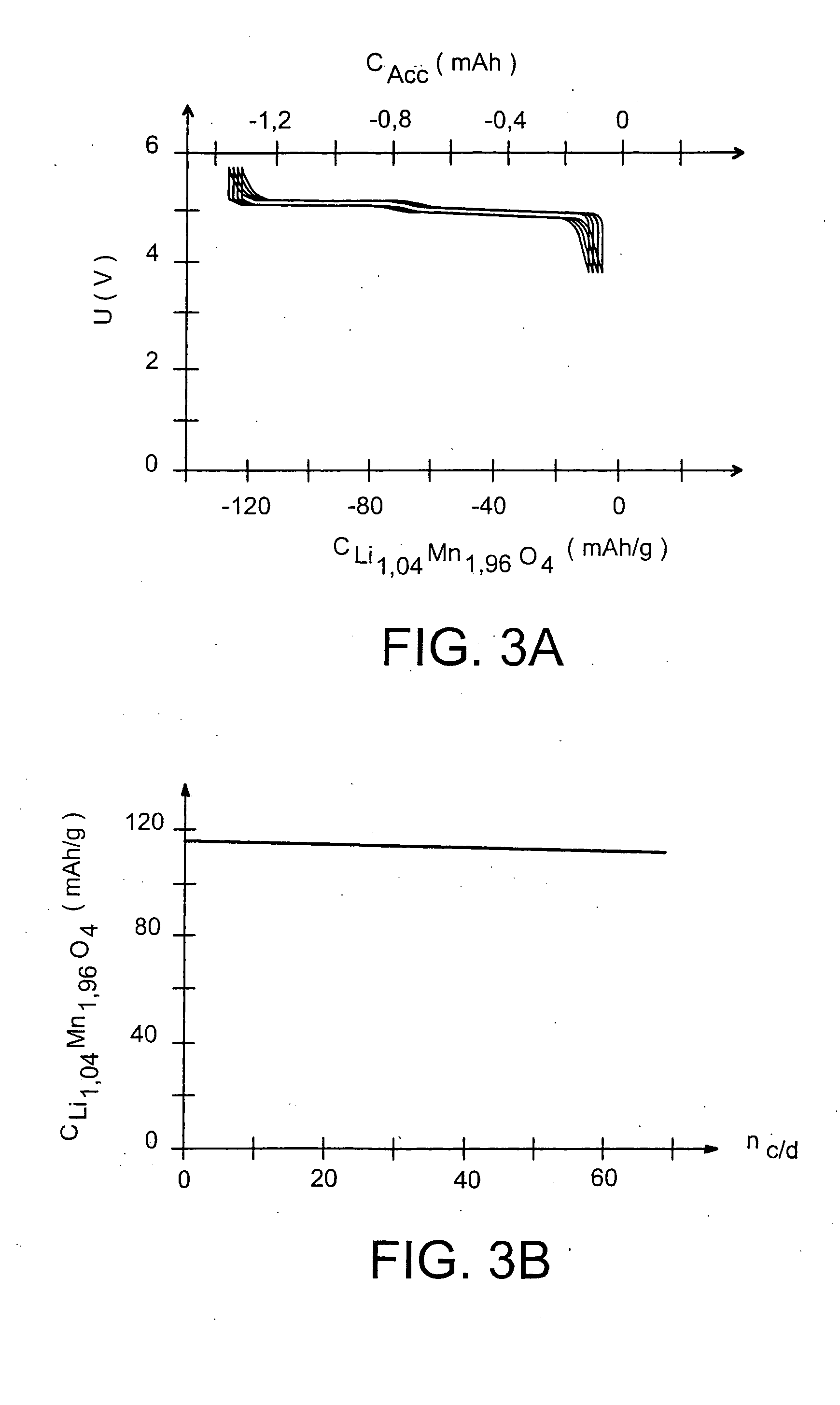Lithium electrochemical generator comprising at least a bipolar electrode with conductive aluminium or aluminium alloy substrates
a technology of lithium electrochemical generator and bipolar electrode, which is applied in the direction of negative electrode, bipolar electrode, non-aqueous electrolyte cell, etc., can solve the problems of limiting the power performance of lithium storage batteries and their lifetime, affecting the safety of the battery, so as to improve the intrinsic safety, the effect of reducing the risk of lithium dendrite formation
Active Publication Date: 2005-03-31
COMMISSARIAT A LENERGIE ATOMIQUE ET AUX ENERGIES ALTERNATIVES
View PDF13 Cites 22 Cited by
- Summary
- Abstract
- Description
- Claims
- Application Information
AI Technical Summary
Benefits of technology
The use of such a negative active material having a potential of 1.55 V, which is around 0.25 V higher than the potential for formation of an aluminium-lithium alloy, prevents, on the one hand, the formation of the said alloy and, on the other hand, the formation of lithium dendrites during high-speed charging.
Consequently, the electrochemical generators according to the invention using in particular such a material have
Problems solved by technology
However, research has revealed that repeated recharging of this type of storage battery is ineluctably accompanied by the formation of lithium dendrites, which usually cause the separator, including the electrolyte, to deteriorate.
Lithium storage batteries, such as those described above, therefore comprise a negative electrode operating at very low potential, for example 0 V in the case of lithium metal electrodes or 100 mV in the case of carbon electrodes, and this may consequently entail risks of formation of lithium dendrites, especially during rapid charging.
This phenomenon contributes in particular to limiting the power performance of lithium storage batteries and their lifetime, and also poses safety problems owing to the risks of internal short circuits.
In addition, the fact of using negative active materials at very low potential dictates the use of a current collector material based on copper, which has a high density, for example around 8.96 g/cm3, and this contributes to limiting the energy per unit mass of such a type of storage battery.
Moreover, copper is an expensive material.
Although this architecture does allow the power performance of electrochemical generators to be improved, by reducing the internal resistance of the generator, it pro
Method used
the structure of the environmentally friendly knitted fabric provided by the present invention; figure 2 Flow chart of the yarn wrapping machine for environmentally friendly knitted fabrics and storage devices; image 3 Is the parameter map of the yarn covering machine
View moreImage
Smart Image Click on the blue labels to locate them in the text.
Smart ImageViewing Examples
Examples
Experimental program
Comparison scheme
Effect test
 Login to View More
Login to View More PUM
 Login to View More
Login to View More Abstract
The subject of the present invention is a lithium electrochemical generator comprising two peripheral electrodes—one positive and the other negative—each comprising an electrically conductive substrate (13, 21) and an active layer (14, 20) that includes an active material, at least one bipolar electrode comprising a positive active layer (18) on a first electrically conductive substrate and a negative active layer (16) on a second electrically conductive substrate, the said substrates being fixed together and two separators (15, 19) flanking each bipolar electrode, in which generator the electrically conductive substrates of each bipolar electrode are made of identical or different materials chosen from aluminium and its alloys and the negative active material of the bipolar electrode prevents an aluminium alloy being obtained with the electrically conductive substrates, under the operating conditions of the storage battery.
Description
TECHNICAL FIELD The present invention relates to a lithium electrochemical generator comprising at least one bipolar electrode. The general field of the invention may be defined as that of lithium electrochemical generators. These electrochemical generators operate on the principle of lithium insertion or extraction (or intercalation / deintercalation) on at least one electrode. Specifically, the electrochemical reaction at the origin of current production involves the transfer of lithium cations via a electrolyte conductive of lithium ions, the said cations coming from a negative electrode either being intercalated into the accepter network of the positive electrode or resupplying the electrolyte with lithium ions. Lithium electrochemical generators have rapidly become the subject of considerable development owing to their good results obtained in terms of voltage, energy density per unit mass and energy density per unit volume relative to lead storage batteries or storage batte...
Claims
the structure of the environmentally friendly knitted fabric provided by the present invention; figure 2 Flow chart of the yarn wrapping machine for environmentally friendly knitted fabrics and storage devices; image 3 Is the parameter map of the yarn covering machine
Login to View More Application Information
Patent Timeline
 Login to View More
Login to View More IPC IPC(8): H01M4/02H01M4/131H01M4/1391H01M4/66H01M4/48H01M4/485H01M4/50H01M4/505H01M4/52H01M4/525H01M4/58H01M4/587H01M6/16H01M10/04H01M10/0525H01M10/0561H01M10/0562H01M10/0565H01M10/0566H01M10/058H01M10/36
CPCH01M4/131Y02E60/122H01M4/485H01M4/505H01M4/525H01M4/5825H01M4/587H01M4/661H01M6/166H01M10/044H01M10/0525H01M10/0561H01M10/0562H01M10/0565H01M10/0566H01M10/058H01M2004/027H01M2004/029H01M4/1391Y02E60/10Y02P70/50
Inventor MARTINET, SEBASTIENLE CRAS, FREDERIC
Owner COMMISSARIAT A LENERGIE ATOMIQUE ET AUX ENERGIES ALTERNATIVES
Features
- R&D
- Intellectual Property
- Life Sciences
- Materials
- Tech Scout
Why Patsnap Eureka
- Unparalleled Data Quality
- Higher Quality Content
- 60% Fewer Hallucinations
Social media
Patsnap Eureka Blog
Learn More Browse by: Latest US Patents, China's latest patents, Technical Efficacy Thesaurus, Application Domain, Technology Topic, Popular Technical Reports.
© 2025 PatSnap. All rights reserved.Legal|Privacy policy|Modern Slavery Act Transparency Statement|Sitemap|About US| Contact US: help@patsnap.com



